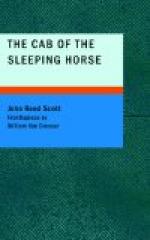“Sure!” said Harleston. “Drive on and keep driving. You won’t drive over me.”
“It isn’t a great deal,” Carpenter went on, slowly tearing the consonant collection into bits, “and perchance it wasn’t your Mrs. Clephane; but her name, and her beauty and charm, and Paris, and some other inferences I drew, led me to suspect that—” He completed the sentence by a wave of his hand. “She was Robert Clephane’s wife—yes, I see in your face that she is your Mrs. Clephane—and he led her a merry life, though if rumour lied not she kept up with the pace he set. I saw her frequently and she was as—well you have not overdrawn the ‘reticence picture.’ Shall I continue?”
Harleston smiled and nodded.
“Doubtless you already know the tale,” Carpenter remarked.
“I know only what Mrs. Clephane has told me,” Harleston replied.
The Fifth Assistant Secretary picked up a ruler and sighted carefully along the edge.
“I seem to be in wrong, old man,” he said. “Please forget that I ever said it or anything—you understand.”
“My dear fellow, don’t be an ass!” Harleston laughed. “I’m not sensitive about the lady; I never saw her until last night.”
“Quite long enough for a man disposed to make a fool of himself—if the lady is a beauty.”
“I’m disposed to hear more from you, if you care to tell me,” Harleston replied. “However, jesting aside, Carpenter, what do you know? Mrs. Clephane is something of a puzzle to me, but I have concluded to accept her story; yet I’m always open to conviction, and if I’m wrong now’s the time to enlighten me—the State comes first, you know.”
“Are you viewing Mrs. Clephane simply as a circumstance in the affair of the cipher letter?” Carpenter asked.
“Certainly!” said Harleston.
“Then I’ll give you what I heard. It’s not much, and it may be false; it’s for you to judge, in the light of all that you know concerning her, whether or not it affects her credibility. Mrs. Clephane went with a notoriously fast set in Paris, and her reputation was somewhat cloudy.”
“I know of that,” returned Harleston, “also that Clephane was a roue, and generally an exceedingly rotten lot.”
“Precisely—and her conduct as to him may be quite justifiable; yet nevertheless it weakens her credibility; puts her story as to the letter under suspicion. And there is one thing more: Clephane, you know, was killed in an aeroplane smash. Did Mrs. Clephane tell you anything as to it?”
“Merely referred to it.”
“Well, at a dinner the night before, he effervesced that his wife had repeatedly tried to poison him, and had told him only that evening that she hoped the flight of the morrow would be his last, and that he would fall so far it would be useless to dig for his remains. At the aviation field the following day he appeared queer, and his friends urged him not to try the flight; but he waved them aside, with the remark that maybe Mrs. Clephane had drugged him and at last would win out. His fall came a trifle later. Suspicion followed, of course.”




